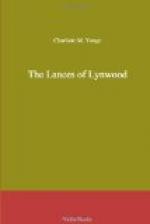“You here, Lord Edward?” exclaimed Arthur, who had not perceived that the Prince had followed him. “Oh yes, thanks, thanks! None but the Prince can save him. Oh, let me see him myself, and that instantly!”
“Then, let us come,” said Edward, still holding Arthur’s hand.
Arthur set off at such a pace, as to press the little Prince into a breathless trot by his side; but he, too, was all eagerness, and scorned to complain. They proceeded without interruption to the court of the palace. Edward, leading the way, hastened to his mother’s apartments. He threw open the door, looked in, and, saying to Arthur, “He must be in the council chamber,” cut short an exclamation of Lady Maude Holland, by shutting the door, and running down a long gallery to an ante-chamber, where were several persons waiting for an audience, and two warders, with halberts erect, standing on guard outside a closed door.
“The Prince is in council, my Lord.”
Edward drew up his head, and, waving them aside with a gesture that became the heir of England, said, “I take it upon myself.” He then opened the door, and, still holding Arthur fast by the hand, led him into the chamber where the Prince of Wales sat in consultation.
There was a pause of amazement as the two boys advanced to the high carved chair on which the Prince was seated—and Edward exclaimed, “Father, save Arthur’s uncle!”
“What means this, Edward?” demanded the Prince of Wales, somewhat sternly. “Go to your mother, boy—we cannot hear you now, and—”
“I cannot go, father,” replied the child, “till you have promised to save Arthur’s uncle! He is wounded!—the traitors have wounded him!—and the French will take the Castle, and he will be slain! And Arthur loves him so much!”
“Come here, Edward,” said the Prince, remarking the flushed cheek and tearful eye of his son. “and tell me what this means.”
Edward obeyed, but without loosing his hold of his young friend’s hand. “The man-at-arms is come, all heat and dust, on the poor drooping, jaded steed—and he said, the Knight would be slain, and the Castle taken, unless you would send him relief. It is Arthur’s uncle that he loves so well.”
“Arthur’s uncle?” repeated the Prince—and, turning his eyes on the suppliant figure, he said, “Arthur Lynwood! Speak, boy.”
“Oh, my Lord,” said Arthur, commanding his voice with difficulty, “I would only pray you to send succour to my uncle at Chateau Norbelle, and save him from being murdered by Oliver de Clisson.”
It was a voice which boded little good to Arthur’s suit that now spoke. “If it be Sir Eustace Lynwood, at Chateau Norbelle, of whom the young Prince speaks, he can scarce be in any strait, since the garrison is more than sufficient.”
The little page started to his feet, and, regarding the speaker with flashing eyes, exclaimed, “Hearken not to him, my Lord Prince! He is the cause of all the treachery!—he is the ruin and destruction of my uncle;—he has deceived you with his falsehoods! —and now he would be his death!”




